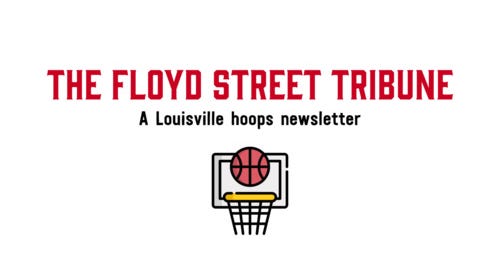The Floyd Street Tribune: Why Chris Mack didn't work at Louisville, and where Louisville goes next
Inside: Louisville men's basketball has arrived at a crossroads. We discuss the direction it may go -- and the factors that led to this moment.
Thanks for reading The Floyd Street Tribune. In the previous edition, we shared our favorite Russ Smith stories.
I want to use this newsletter as my definitive version of how things went awry for Chris Mack. I give credit where it’s due — it wasn’t all bad for Mack — and offer a heavy dose of nuggets that previously haven’t come to light for a variety of reasons. The opening portion of the newsletter, free to all subscribers, focuses on how the negotiated departure went down. For paid subscribers only, we then get into my perspective, based on four years of reporting and being around the program, on how everything went wrong and what’s next for Louisville.
I apologize that this newsletter comes to you later than usual: We were in the hospital until late Wednesday afternoon with our very awesome newborn son, who was born on Monday. So, grab a cup of coffee or a strong bourbon and tap in. This is exhaustive and wide-ranging and will take a while to get through. The coaching search stuff will be the last section.
How everything went down
As you well know by now, Louisville and Chris Mack reached an agreement to part ways, with the school announcing Mack’s departure late Wednesday afternoon. Louisville paid Mack $4.8 million in a negotiated buyout of what was a seven-year, $28-million contract. Mike Pegues will coach the team the remainder of the season.
Some close to Mack said the coach knew earlier this month he was on borrowed time at Louisville, like someone ticking the days off the calendar one-by-one until the end of the season. (I think that was fairly obvious in his postgame press conferences, as I wrote about after the NC State loss.) The Notre Dame loss was the final straw, with Mack first engaging the negotiated-buyout talks for an as-soon-as-possible exit.
Mack’s buyout was $12 million, but the looming adjudication of Louisville’s NCAA infractions case, paired with his desire to chart an exit strategy, helped lower that number to $4.8 million. I was told he offered to take a $6 million buyout and Louisville countered with something closer to $3.5 million, and they met in the middle. U of L will pay Mack $133,333.33 a month until January 2025, and the agreement will not be impacted by Mack’s future employment status. In other words, he still gets paid even if he gets another job, though he doesn’t really seem interested in doing that at this point. His family loves Louisville and Mack really needs a break from coaching — the last year took a toll.
There was a lot of curiosity over whether Louisville might wait to fire Mack until the infractions ruling. If the independent panel found that Mack committed Level 2 violations of NCAA rules, Louisville could fire him with cause, which means no buyout money required to terminate his contract. There is a chance Mack saw a window to an exit parachute potentially closing, though there’s also the possibility the Independent Resolution Panel doesn’t find that Mack committed that level of violation. U of L would have been in an awkward spot if those findings came back months into the offseason.
I’ll get deeper into this later, but I sensed for about a year that we might be headed toward a mutual parting of ways, a departure for another job or a firing. There were signs that Mack didn’t necessarily like the job he had and that whatever momentum he had after a solid first season and a very strong second had faded, but I only interpreted them as potentially fixable cracks in the foundation. The pandemic has been hard on everyone, and it played a major role in expediting this whole ordeal, perhaps by a few years.
If you asked me a year ago how Mack’s time at Louisville might play out, knowing what I know about him and what we all know about the program, I honestly thought the likeliest scenario was Mack coaching close to the length of his contract but not past it. In that scenario, say, after Year 6, the coach, the fan base and the school all would arrive at a point where none of them were particularly happy with the arrangement. But the untenable, nobody-is-happy mood came much sooner, exacerbated by offseason blunders that sank a critical Year 4 before it ever really got going.
All in all, Mack did some things well — he really did relate to a big portion of the fan base early on his tenure, and his work to reconnect Louisville to its rich tradition and history should not be dismissed. His first two teams responded well to him, too. But he also too often pursed a path of lower resistance in recruiting, approached his public media appearances in a way that did not inspire optimism and hope in the fan base and stumbled when confronting difficult basketball situations that required adjustments and fresh thinking.





